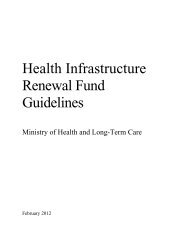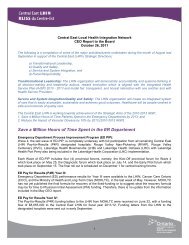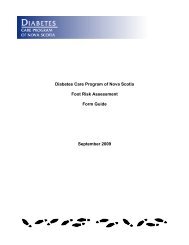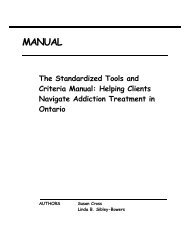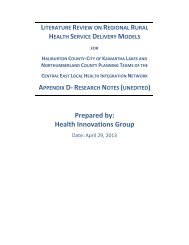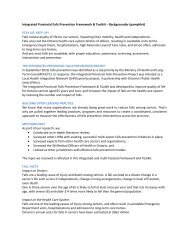CDE Appendix 1 Literature Review - Central East Local Health ...
CDE Appendix 1 Literature Review - Central East Local Health ...
CDE Appendix 1 Literature Review - Central East Local Health ...
Create successful ePaper yourself
Turn your PDF publications into a flip-book with our unique Google optimized e-Paper software.
The Culture, Diversity and Equity Project: <strong>Literature</strong> <strong>Review</strong><br />
The (2004) Discussion paper of the <strong>Health</strong> Disparities Task Group for Public <strong>Health</strong> Canada, for instance,<br />
commendably recommends examining the health status of Aboriginal peoples, single mothers in poverty, women,<br />
homeless people, and refugees, but lacks a more explicit ethno-racial lens of analyses.<br />
<strong>Health</strong> Equity in <strong>Health</strong>care Frameworks<br />
Strengths<br />
Forming a bridge between health equity and healthcare equity frameworks, health equity in healthcare framework<br />
have the benefit of keeping within their analytical and strategic purview determinants of health and health inequity<br />
that lie beyond the healthcare system, and employing such analyses to effectively and creatively inform appropriate<br />
(holistic, prevention-based) strategies to address such inequities within the healthcare system (as illustrated in<br />
Gardner’s many recommendations which share a holistic, community-empowerment perspective focusing<br />
‘upstream’ on prevention and health promotion).<br />
In concerning themselves with the broad determinants of health status, yet from the situated standpoint of the<br />
healthcare system, and what it can do to reduce inequities in health status, health equity in healthcare frameworks<br />
have the added appeal and benefit of being more easily operationalized within local/regional healthcare contexts and<br />
settings such as the LHINs.<br />
Limitations<br />
The two health equity in healthcare frameworks engaged in this literature review did not explicitly base themselves<br />
upon any etiological model or evidence-base of the causes of health in/equity and the most effective solutions.<br />
While these frameworks (e.g. Gardner, 2008a) offer many concrete recommendations for LHINs action, it would be<br />
useful to more explicitly wed such intervention frameworks to a more self-consciously elaborated, evidence-based,<br />
conceptual framework and model.<br />
<strong>Health</strong>care Equity Frameworks<br />
Strengths<br />
<strong>Health</strong>care equity frameworks taking a more narrow and focused approach on healthcare inequities have, as a<br />
particular strength, their ‘do-ability’ and ‘translatability’ into action in and by the healthcare sector.<br />
Cultural competence frameworks – the main form of healthcare equity frameworks discussed in this review - are<br />
particularly commendable for their close attention to the ways in which cross-cultural dynamics within healthcare<br />
settings can seriously and negatively impact upon the accessibility and quality of healthcare services received by<br />
cultural minorities (Registered Nurses Association of Ontario, 2007; Stampino, 2007; Simich et al., 2006; Basok,<br />
2007).<br />
Cultural competence frameworks have as a particular strength their close attention to the cultural ingredients of<br />
successful interpersonal relations, exchanges, and communication, all of which are critical to successful, patientcentred,<br />
health outcomes in healthcare contexts.<br />
In plural, immigrant-based, multicultural societies such as Ontario, where there is a significant level of ethnocultural<br />
diversity, cultural competence frameworks may be of particular use, given their focus on inter-ethnic<br />
relations.<br />
Limitations<br />
<strong>Health</strong>care equity frameworks have been critiqued for failing to consider and engage the most important and<br />
consequential determinants of health that are situated ‘upstream’ from the healthcare sector. Though not within the<br />
direct control of the healthcare sector, critics argue that the healthcare sector can play a lead role in advancing and<br />
advocating a more holistic approach to health that better addresses and accounts for the broader social determinants<br />
51



